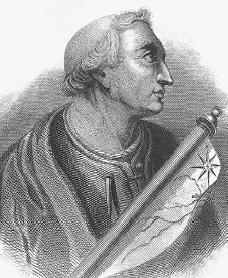
Columbus
Were it not for
accidents of history that catapulted mankind into an era of
technological advancement, where would we be today? What
would the world look like? Had the great geographer of
antiquity, Mr. Ptolemy, not underestimated the size of the world
that lay to the east of Gibraltar, would Christopher Columbus have
ever dared to set sail to the west in his tiny ships, thirteen
centuries later. For more, click here
Ptolemy's error
allowed Columbus to believe that the coast of Asia lay no more than
5,000 nautical miles to the west of the Canary Islands - an error
of 8,000 miles. Given the ships of Columbus' day, a sail of
13,000 miles would have been out of the question. Without
Ptolemy's error, the 'discovery' of the Americas by Europeans might
have waited another two or three centuries.
Given the
crudeness of their tools and methods, today we can only marvel at
the accomplishments of the early European navigators and the skill
of the cartographers. For more, click here
Being the first sailor to
cross the 'great pond' was a monumental achievement, but even that
was not enough for Columbus to win the public relations war in his
own lifetime. Soon after his discoveries were announced to
the European world, other explorers were launching their own
voyages. Among these, a Florentine named Amerigo Vespucci was
the first to survey the northwest coast of South America, an
achievement that earned him exaggerated standing back home.
His celebrity resulted from his ability to promote his own talents
and skills as an explorer, and to minimize the achievements of
others. As a result, his name, rather than Columbus',
would be affixed to the all-important nautical charts of the New
World.
Related Events
Related Flashpoints